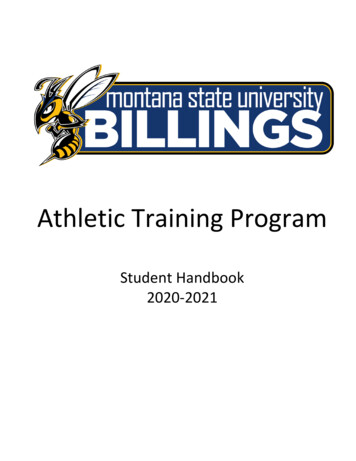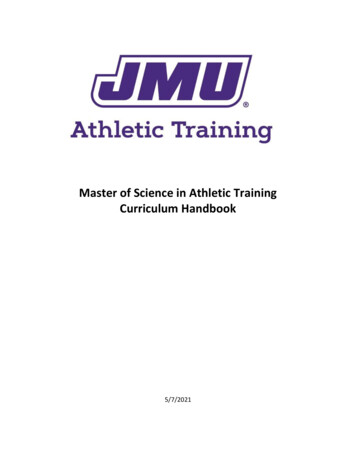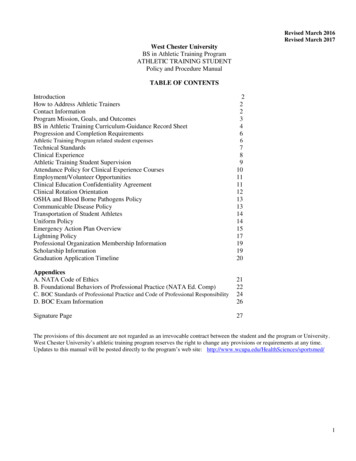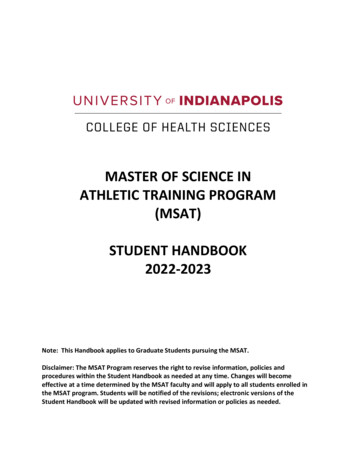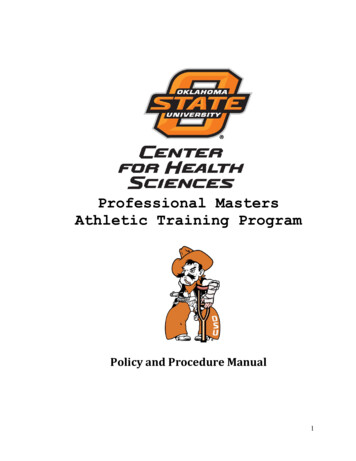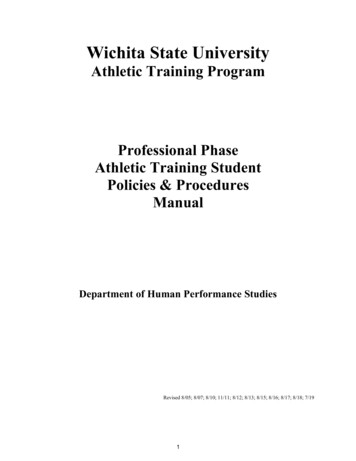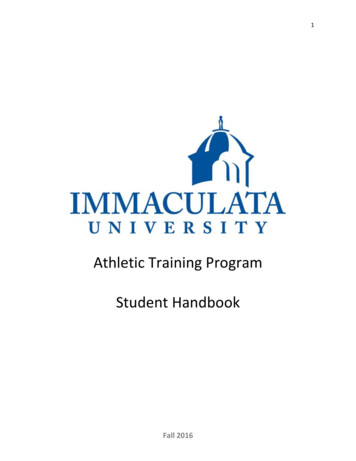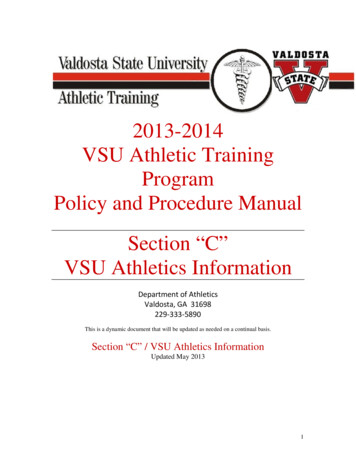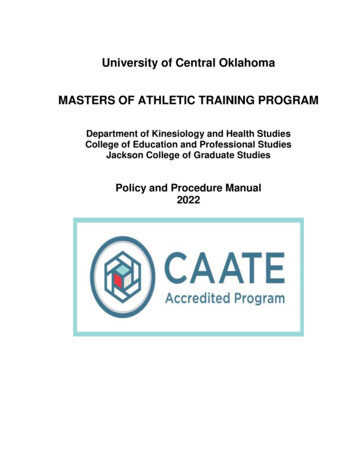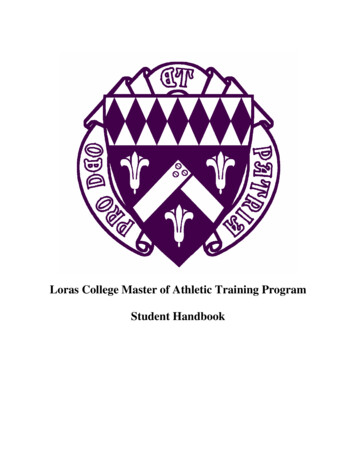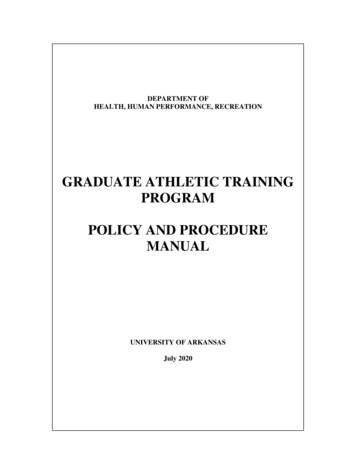
Transcription
DEPARTMENT OFHEALTH, HUMAN PERFORMANCE, RECREATIONGRADUATE ATHLETIC TRAININGPROGRAMPOLICY AND PROCEDUREMANUALUNIVERSITY OF ARKANSASJuly 2020TABLE OF CONTENTS
ContentsForeword. 3Equal Opportunity and Sexual Harassment Policy . 3Graduate Athletic Training Program Personnel . 4Graduate Athletic Training Program . 5Mission Statement . 5Program Goals . 5History . 5Admissions . 6Selective Admission Policy . 6Admission Requirements and Procedures . 6Transfer Policy . 8Program Expenses . 8Technical Standards. 9Selective Retention Policy . 10Student Logistical Procedures . 10Advising . 10Outside Employment . 10Student Liability Insurance . 10Transportation to Clinical Sites . 10Transportation of Student Athletes to Medical Appointments Policy . 10Professional Associations . 11Financial Assistance and Scholarships . 11Blood Borne Pathogen and Community CPR and AED Training . 11HIPAA and FERPA Training . 11Therapeutic Equipment Policies and Procedures. 12Student Conduct. 12Personal Appearance . 12Professional Confidentiality . 13Personal and Social Conduct while Travelling for Clinical Experience. 13Social Media Utilization . 13Maintaining Professional Relationships . 13Differences of Opinion . 14Extra Compensation Policy . 14Clinical Instruction Plan . 15Guidelines for Clinical Experiences . 15Clinical Supervision Policy . 16Traditional Clinical Experiences . 16Clinical Immersion Experience . 17Alterations to the Clinical Instruction Plan . 17Status in the GATP . 19Academic Retention Policy . 19Graduate School Academic Probation . 20Academic Integrity . 20Infraction Policy . 21Inactive Status. 21Curriculum and Course Sequencing, and Requirements for Completion of Degree . 22Courses Outside of the Curricular Plan . 23Research Component . 23Graduation Requirements . 24Understanding Agreement . 25Appendix A: Incident Report Form . 26Appendix B: NATA Code of Ethics . 282
ForewordThe Graduate Athletic Training Program (GATP) at the University of Arkansas is offered by theDepartment of Health Human Performance and Recreation (HHPR). The degree is termed aMaster of Athletic Training. The GATP is designed to prepare students for a career in athletictraining. This manual was prepared to inform students in the GATP at the University ofArkansas of the regulations for participating in the program.Students should be aware that athletic training requirements are subject to annual change in orderto maintain compliance with University and accreditation requirements. Therefore, the athletictraining faculty within the HHPR reserve the right at any time to implement changes as deemednecessary by the Commission on Accreditation of Athletic Training Education (CAATE), and/orthe University of Arkansas. Students majoring in athletic training are responsible for currentinformation regarding the program of study. All current information can be located in thismanual, the athletic training web site, and the University of Arkansas Graduate Catalog.Equal Opportunity and Sexual Harassment PolicyThe University of Arkansas is an equal opportunity, affirmative action institution. The Universityis committed to providing equal opportunity for all applicants for admission and employment,students, and employees without regard to race/color, sex, gender, pregnancy, age, nationalorigin, disability, religion, marital or parental status, protected veteran or military status, geneticinformation, sexual orientation, gender identity or any other characteristic protected underapplicable federal or state law.It is the policy of the University of Arkansas to prohibit sexual harassment or acts of sexualassault, domestic violence, dating violence and stalking committed against students, employees,visitors to the campus, and other persons who use University facilities. Sexual assault is anextreme form of sexual harassment. Sexual harassment is prohibited by University policy and isa form of sex discrimination prohibited by Title VII of the Civil Rights Act of 1964 and by TitleIX of the Education Amendments of 1972. Sexual assault is also a crime, defined by theArkansas criminal code.Title IX protects the University community from gender discrimination, harassment andmisconduct in a school’s education programs and activities. Title IX protects the Universitycommunity in connection with all academic, educational, extracurricular, athletic and otherUniversity programs, whether those programs take place on University property, in Universitytransportation, at a class or training program sponsored by the University at another location orelsewhere.This Policy shall not be construed or applied to restrict academic freedom at the University, norshall it be construed to restrict constitutionally protected expression.3
Graduate Athletic Training Program PersonnelDepartment Administration:HHPR Department Head, Matt Ganio, PhDHHPR Assistant Department Head, Paul Calleja, PhDGraduate Athletic Training Program Faculty:Jeffrey A. Bonacci, DA, ATC, LAT Program Director, Clinical Associate ProfessorBrendon P. McDermott, PhD, ATC, LAT Core Faculty, Associate ProfessorLesley W. Vandermark, PhD, ATC, LAT PES – Coordinator of Clinical Education,Clinical Assistant ProfessorAl Gordon, MD – Medical Director, Graduate Athletic Training Program4
University of ArkansasGraduate Athletic Training ProgramThe GATP at the University of Arkansas has been designed to meet the CAATE standards andguidelines for instruction in athletic training. Students who are admitted to the GATP will berequired to complete a variety of clinical experiences as an athletic training student.Mission StatementIt is the mission of the Graduate Athletic Training Program (GATP) at the University ofArkansas to produce competent evidence-based health care professionals who treat thephysically active.Program GoalsGoal 1: Maintain appropriate rates for passing the Board of Certification for Athletic Trainers(BOC) examination, student retention, graduation, and employment.Goal 2: The GATP will promote a sense of service to the profession and community at large.Goal 3: The GATP will foster clinical decision-making and critical thinking among students.Goal 4: The GATP will promote scholarly work and scientific inquiry among students.Goal 5: The GATP will provide high quality instruction to students.HistoryTo ensure that educational programs for athletic trainers include the appropriate content,the Commission on Accreditation of Athletic Training Education (CAATE) guaranteesadherence to the basic educational Standards and Guidelines. CAATE is responsible foraccrediting athletic training education programs so that such accreditation standards are met andmaintained in educating students in preparation for professional athletic training.The GATP received initial national accreditation in 2005, the GATP faculty consisted ofa full time program director, Dr. Jeff Bonacci, and 50% part-time faculty member Mr. PhilVardiman. In April of 2005, as a result of accreditation standards, Mr. Vardiman was promotedto full time status faculty member. In July 2005 he resigned to accept a position at the Universityof Kansas. Following a year, a national faculty search replacement, Dr. Gretchen Oliver washired as the clinical education coordinator for the GATP. The second national accreditation sitevisit occurred Spring 2010 and the GATP received a five year accreditation 2014-2015.Following several annual accreditation reports and changes within the CAATE organization, thenext accreditation site visit was rescheduled for 2019-2020. In March of 2012, Dr. Oliverresigned her position to take another position at Auburn University. Dr. Brendon McDermottaccepted the position as clinical education coordinator for the GATP. In April 2016, the GATPhired Dr. Lesley Vandermark as an additional faculty member to serve as co-clinical coordinatoralong with Dr. McDermott. In May 2016 the GATP program retrofitted and equipped HPER 320classroom as an exclusive teaching lab. In May 2018, Dr. Vandermark assumed fullresponsibility as clinical education coordinator for the GATP.5
AdmissionsSelective Admission PolicySelection for admission into the GATP is determined every year as prospective students apply.Application may occur after/during the completion of an undergraduate degree, completion ofrequired prerequisite/deficiency courses. The athletic training application, technical standards,and other program requirements can be found on the University of Arkansas Athletic TrainingWeb Site (http://atep.uark.edu) and the University of Arkansas Graduate Catalog. Notificationof the application process will be announced in the University of Arkansas HHPR undergraduatecourses, the GATP website, the current University of Arkansas graduate catalog, and advertisedat national and regional professional conferences.Admission Requirements and ProceduresBecause of national accreditation standards/guidelines, admission into the athletic trainingprogram is selective. Therefore, admission to the Graduate School of the University of Arkansasdoes not guarantee admission into the GATP. The following are qualifying criteria in addition tothe general requirements for admission to the Graduate School:1. Acceptance into the University of Arkansas Graduate School2. An undergraduate degree in kinesiology or a related field and the following admissionstandards: An overall undergraduate GPA of 3.00 Graduate Record Exam score Students desiring admission must complete the following courses prior to staringcourse work in the GATP: HESC 1213 Nutrition in Health EXSC 3153 Exercise Physiology EXSC 3353 Mechanics of Human Movement BIOL 2213 2211L Human Physiology and Lab BIOL 2443/2441L Anatomy and Lab BIOL 1543 Principles of Biology (ACTS Equivalency BIOL 1014 Lecture)and BIOL 1541L Principles of Biology Laboratory (ACTS Equivalency BIOL 1014 Lab) CHEM 1103 University Chemistry I (ACTS Equivalency CHEM 1414Lecture) and CHEM 1101L University Chemistry I Laboratory (ACTS Equivalency CHEM 1414 Lab) or Chemistry for Majors I and Chemistry for Majors ILaboratory oPHYS 2013 College Physics I (ACTS Equivalency PHYS 2014 Lecture)and PHYS 2011L College Physics I Laboratory (ACTS Equivalency PHYS2014 Lab)o PSYC 200 General Psychology (ACTS Equivalency PSYC 1103)*If the above courses were obtained at a college/university other than the University ofArkansas, course syllabi/outlines for courses they are requesting to meet therequirements must be submitted to the Program Director for approval.3. A minimum of 150 hours of observation under the direct supervision of a certifiedathletic trainer.4. Three professional letters of recommendation; typical letters come from an instructor andsupervising athletic trainer(s) in conjunction with GATP letter of recommendation form6
5.6.7.8.Ability to begin course work during the first summer session of the admission year.Copy of all un-official transcripts.Completion of GATP online application.Fulfillment, with or without accommodations, of the GATP technical standards (seeTechnical Standards)9. A pre-admission physical examination must be completed. Once the program director notifies the student that they have been conditionallyadmitted to the GATP they must complete a physical examination by a board certified(MD, DO) physician in accordance with the GATP technical standards. Once thecompleted physical examination form (sent in your admission letter) is received (atthe predetermined date), full admission status will be granted. Applicants who may not meet these technical standards, but may requestaccommodation, are encouraged to contact the Program Director.10. Completion of a background check. Once the Program Director notifies the student that they have been conditionallyadmitted to the GATP they must complete an Arkansas background check. Allbackground check forms will be sent to the student with their conditional admissionletter. Once the Arkansas background check is completed on the predetermined dateon the conditional acceptance letter, the program director will verify that thebackground check on this web spxh Students can verify their background as well with the same website. All expensesincurred with the background check are the student’s responsibility.11. Documentation of current vaccinations. MMR vaccination submitted to the U of A Pat Walker Health Center onimmu@uark.edu Hepatitis B vaccination or waiver Once the Program Director notifies the student that they have been conditionallyadmitted to the GATP, they must show proof of MMR and Hepatitis Bvaccination, or sign a waiver, on the predetermined date in the conditionalacceptance letter.Following the deadline for application, the athletic training selection committee, which iscomprised of the three athletic training faculty and three preceptors from the U of A athleticdepartment, reviews all completed applications. Review includes the areas of prior coursework,GPA and GRE, work experience, letters of recommendation, and writing ability (essayrequirement). The selection process will result in one of the following scenarios for each student: Accepted for early admission: Individuals interested in early admissions/acceptance intothe GATP must have all application materials submitted between 8/15 and 10/1.Individuals not selected for early admission, but with completed application materials,will be automatically considered for regular admission. Accepted for regular admission: Regular admission deadline is January 8th of every year. Wait-List Denial of admissionOnce a determination has been rendered concerning the applicant’s admission, a formal letternoting acceptance, denial, or placement on a wait-list will be sent to the applicant. Presently, theGATP accepts approximately 22 students per cohort.7
Transfer PolicyTransfer students wishing to enter the program must submit an athletic training programapplication, three recommendation forms, as well apply to the graduate school and submit allundergraduate transcripts. Transfer students will be assessed on an individual basis.Program Expenses(Excluding Tuition and Fees)There will be costs associated with mandatory functions of the GATP. Students are required tocover these costs in addition to tuition. More information about costs associated with the GATPon the website: www.atep.uark.eduExtra Program ExpensesCriminal Background CheckCost 48.00Textbook 2.5 yearsTravel to/from clinical site (gas money)Approx 1000.00 100.00 per semesterLiability Insurance (2 calendar years) 29.00Clinical Course feesCPR training (2 calendar years)Typhon AHST (7 calendar years)Approx. 15 persemester 65.00 90.00Total: 2.5 yearsApprox 1700DescriptionProcedures on programwebsiteCost may vary depending onlocation of clinical siteWill be covered via course feesfor ATTR 5223 and ATTR5262Clinical management system;will be covered via course feesfor ATTR 52138
Technical StandardsThe athletic training program in the Department of Health, Human Performance, and Recreationat the University of Arkansas is a rigorous and intense program that places specific requirementsand demands on the students enrolled in the program. An objective of this program is to preparegraduates to enter a variety of employment settings and to render care to a wide spectrum ofindividuals engaged in physical activity. The technical standards set forth by the athletic trainingeducation program establishes the essential qualities considered necessary for students admittedto this program to achieve the knowledge, skills, and competencies of an entry-level athletictrainer, as well as meet the expectations of the program 's accrediting agency (Commission onAccreditation of Athletic Training Education CAATE). The following abilities and expectationsmust be met by all students admitted to the athletic training education program. In the event astudent is unable to fulfill these technical standards, with or without reasonable accommodation,the student will not be admitted into the program. Applicants who may not meet these technicalstandards are encouraged to contact the Program Director of Athletic Training Education, 303HPER Building, and University of Arkansas. The following are the technical standards:A.B.C.D.E.F.G.H.I.J.Candidates must be able to actively learn from observations, demonstrations, andexperiments in the basic sciences.Candidates must be able to learn to analyze, synthesize, solve problems, and reachassessment and therapeutic judgments distinguished from the norm.Candidates must have sufficient sensory function and coordination to perform appropriatephysical examinations using acceptable techniques.Candidates must be able to relate effectively to athletes and the physically active and toestablish sensitive, professional relationships with them.Candidates are expected to be able to communicate the results of the assessment to theinjured or ill exerciser, to responsible officials, to parents or guardians, and to colleagueswith accuracy, clarity, and efficiency.Candidates are expected to learn and perform routine prevention, assessment, emergencycare, therapeutic procedures.Candidates are expected to be able to display good judgment in the assessment and treatmentof injured or ill athletes and physically active individuals.Candidates must be able to learn to respond with precise, quick, and appropriate action inemergency situations.Candidates are expected to be able to accept criticism and respond by appropriatemodification of behavior.Candidates are expected to possess the perseverance, diligence, and consistency to completethe athletic training degree curriculum as outlined and sequenced, to attempt BOCcertification within the year of program completion, and to enter the practice of athletictraining.I certify that I have read and understand the technical standards for selection listed above, and I believe to the best of myknowledge that I meet each of these standards, with or without a reasonable accommodation. I understand that if I am unable tomeet these standards, with or without a reasonable accommodation, I will not be admitted into the program. I will contact theCenter for Educational Access at the University of Arkansas at 575-3104 to determine what reasonable accommodations may beavailable if needed.9
Selective Retention PolicyFailure to meet the following retention standards may result in probation, suspension, ordismissal from the GATP. (See the Infraction Policy)1. Enrolled as a full-time student2. Achieve satisfactory evaluations in clinical experiences before progressing3. Complete course sequence indicated by the program, unless approved by GATP faculty4. Abide by the Code of Ethics of the NATA5. Maintain CPR and First Aid certification6. Maintain current immunizations (MMR)7. Maintain academic GATP requirements – (See academic retention policy page 17)Student Logistical ProceduresQuestions or concerns about these policies and procedures should be directed to the programdirector or the student’s academic advisor.AdvisingStudents who are admitted into the GATP will be advised by the program faculty of the GATP.Advising is much more than just scheduling courses. This allows time for the student andfaculty to discuss progress and provide feedback, areas of success and improvement, and futuregoals. The academic advisor for the student can be found in UAConnect.Outside EmploymentThe curriculum requires students to complete required extensive afternoon, evening, andweekend clinical experiences, as well as coursework. This will likely interfere with the student’sability to hold outside employment. Students are not prohibited from holding outsideemployment, but such employment must not interfere with the student’s ability to completeclinical experiences and courses.Student Liability InsuranceAll students that are admitted into the GATP must purchase a liability insurance providing 1M/ 3M coverage. Students purchase the liability coverage offered by the university for 14.50 per year via course fees in fall clinical courses each year. Students may not take part inclinical experiences without insurance coverage.Transportation to Clinical SitesStudents are responsible for their own transportation to and from their clinical experiences. Oncampus assignments are typically at sites on the campus university bus (Razorback Transit) loopand in walking distance from the HPER building. Students will have at least one off-campusclinical experience in the GATP.Transportation of Student Athletes to Medical Appointments PolicyStudents admitted to the GATP at the University of Arkansas may not utilize their personalvehicle or any other student’s vehicle to transport student athletes to medical appointments.However, following approval from the Athletic Departments, the athletic training student mayutilize a university owned vehicle to transport a student athlete to medical appointments.10
Professional AssociationsStudents are highly encouraged to join the National Athletic Trainers’ Association. Membershipincludes three components; national membership, as well as district and state memberships. Allthree components are included in the NATA membership dues. Membership cost depends uponthe state in which the student registers her/his home address, and ranges from 50- 95 for newmembers, and 70- 115 for renewing members. Membership in the NATA provides numerousbenefits including a subscription to the NATA NEWS, reduction in cost (60-35 dollars) with BOCexam application fee – not the BOC exam registration fee, as well as discounts on conferenceregistration. Most state, district and national scholarships require membership for eligibility.Students will be required to submit verification of membership on a predetermined date.Financial Assistance and ScholarshipsStudents may be offered financial assistance, defined as a scholarship, to prospectivestudents on an equal basis, determined annually based on donor contribution to the GATP. Suchfinancial assistance can be used towards the student's educational expenses. In addition, allstudents are encouraged to apply for financial aid through the University of Arkansas FinancialAid Office and professional organizations. The scholarship does not cover the cost of tuition andfees.Students that are underrepresented in graduate degree programs at the University ofArkansas are eligible to apply for Benjamin Franklin Lever Graduate Tuition Fellowship.Consult the University of Arkansas Graduate School for an application, or the Graduate Schooland International Education web site. The GATP faculty have no part in selection for thisfellowship.Additionally, the GATP offers three program scholarships (6 total recipients) in thespring each year to students transitioning from first to second-year. They are the William Ferrelland Dean Weber athletic training scholarships. Also, the Al Gordon Athletic TrainingScholarship (non-endowed) is also available. These scholarships are available to second yearathletic training students. See GATP Program Director for application. Notification of thescholarship awarded to the student will be determined following the review of all applicationmaterials by the scholarship selection committee.Blood Borne Pathogen and Community CPR and AED TrainingAll students are required to be currently trained in Bloodbourne Pathogen (BBP) safety,cardiopulmonary resuscitation (CPR), and automated external defibrillation (AED) at all timesduring enrollment in the GATP after the first summer semester. Opportunities for BBP, CPR,and AED training will be offered to the student in the first summer (CPR and AED with anassociated training fee). The student is responsible for providing proof of current training to theProgram Director.Hepatitis B Vaccination: All GATP students are required to have the HEP-B vaccination orwaiver. Waiver can be obtained from the GATP Program Director.HIPAA and FERPA TrainingAll students are required to be trained on Health Insurance Portability and Accountability Act(HIPAA) and Family Educational Rights and Privacy act (FERPA) regulations in the firstsummer semester. The training wi
The Graduate Athletic Training Program (GATP) at the University of Arkansas is offered by the Department of Health Human Performance and Recreation (HHPR). The degree is termed a Master of Athletic Training. The GATP is designed to prepare students for a career in athletic training.
